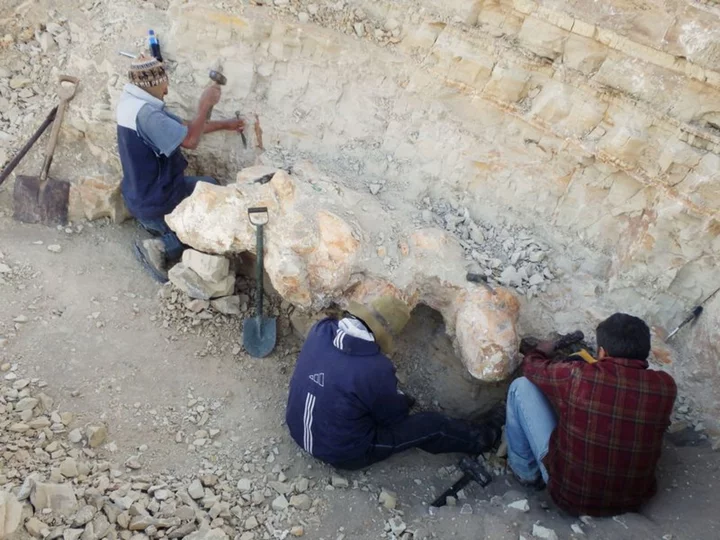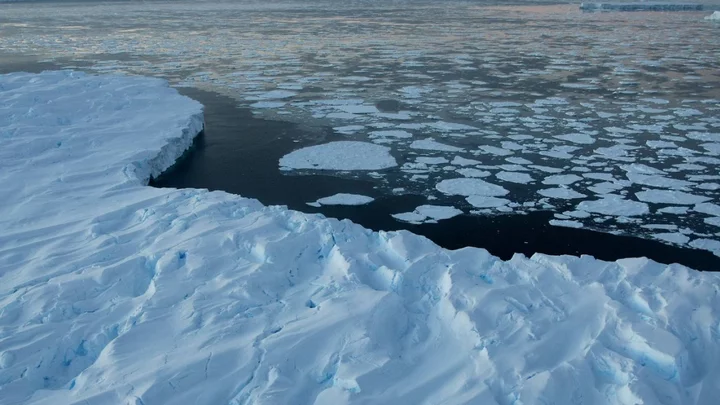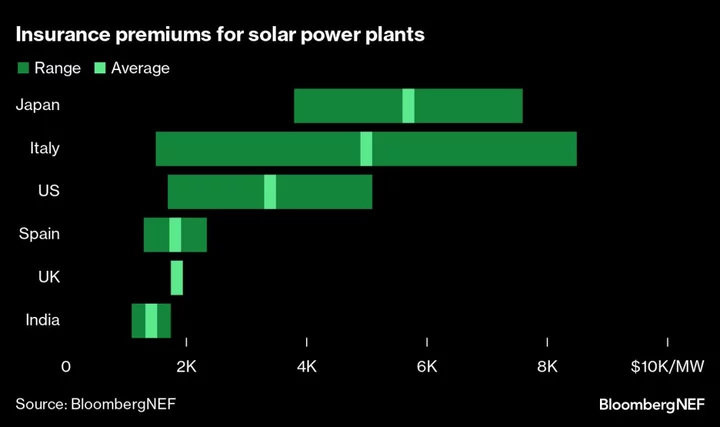
Corporate ESG Claims to Soon Face Audits to Address Greenwashing Fears
The disclosures that companies make about their green credentials will be evaluated by new global audit standards that
2023-08-03 01:56

German heavy metal festival halts admissions as rain turns site to mud
A heavy metal festival in Germany's has been forced to halt admissions after heavy rain turned the site into a mud bath.
2023-08-03 00:48

Ancient whale from Peru may be most massive animal ever on Earth
By Will Dunham Move over, blue whale. There is a new contender for the most massive animal in
2023-08-02 23:15

There’s a Scientific Reason Why Some People Love the Smell of Gasoline
If you find the pungent aroma of gas pleasant at the pump, you're not alone. Here's why fuel tickles your brain.
2023-08-02 22:54

Mud-struck German heavy metal bash slashes attendance
The world's biggest heavy metal music festival starting in northern Germany on Wednesday was forced to cap attendance after heavy rains turned its outdoor...
2023-08-02 22:47

What is premenstrual dysphoric disorder?
Premenstrual Dysphoric Disorder (PMDD) is a severe form of premenstrual syndrome (PMS), and is thought to affect more than one in 20 menstruating women. Actor and stand-up comedian Bella Humphries suffers from PMDD, and told the BBC: “My period sometimes makes me want to take my life.” According to the International Association for Premenstrual Disorders (IAPMD), 34% of the people who have been diagnosed with the condition have attempted suicide. Humphries, 29, continued: “It’s secrecy and silence that will kill people, not the disease or the disorder.” According to the IAPMD, it takes on average 12 years to be diagnosed with the condition. Here’s everything you need to know about it… What is PMDD? PMDD is a severe form of PMS, and is characterised by debilitating physical and emotional symptoms that occur during the time between ovulation and when the period is due to begin. This is known as the luteal phase and lasts around two weeks – although the length can vary from person to person. In June 2019, the World Health Organisation (WHO) added PMDD to the International Statistical Classification of Diseases and Related Health Problems, meaning it’s now recognised as a legitimate medical diagnosis. What are the symptoms? People with PMDD might experience a broad range of symptoms, and it’s different for everyone. “In PMDD, symptoms are extreme and can seriously impact quality of life, work and relationships. Many women report feeling suicidal,” said Dr Ghazala Aziz-Scott, a specialist in integrative women’s health and bioidentical hormone balancing for the Marion Gluck Clinic. “Symptoms can be cyclical and chronic – they include mood swings, anger, irritability, anger, anxiety, depression, anhedonia [the reduced ability to experience pleasure], fatigue, and brain fog. Physical symptoms include breast tenderness, headaches, bloating, food cravings, and insomnia.” Are there any treatments? Treatments can include “antidepressants, oral contraception and counselling”, said physician associate Simisola Ade. “A discussion with a doctor should be had to decide on what treatment is appropriate and how bad the PMDD symptoms are.” Aziz-Scott continued: “PMDD has a complex aetiology [causes] and it is vital to evaluate the root cause of the hormonal imbalance and if there are also any coexisting psychiatric conditions. “A healthy diet and good lifestyle can go a long way in supporting the body, B6 and magnesium supplementation are helpful and the use of natural progesterone in the second half of the cycle can be very beneficial.” What other things can people do to help? “Women who have PMDD need to be mindful and easy with themselves. Self-care is very important,” said Ade. “Also keeping a cycle diary is key, especially if you suspect you have PMDD, because some people aren’t aware that they have PMDD until they actually start tracking their symptoms and notice that they are cyclical. This can also help diagnosis and treatment be much quicker. “Talking to other people who have PMDD can be very beneficial too. There are international organisations that can help. Be open with your doctor and tailor treatments for yourself to ensure you put things in place when you are in that luteal phase. Getting to know your PMDD symptoms will help to make those symptoms more bearable.” Dr Adiele Hoffman, medical advisor at Flo Health agrees and said: “It’s very common to experience both emotional and physical discomfort in the days leading up to your period. However, these symptoms should not be so severe that they significantly impact your life, work, your family, or your other relationships. “But if they do, however, consistently affect your life, you should show these logs to a doctor. It can be very helpful for the doctor prescribing appropriate treatment. Most importantly, remember that no one should have to live with debilitating PMDD symptoms.” Read More Charity boss speaks out over ‘traumatic’ encounter with royal aide Ukraine war’s heaviest fight rages in east - follow live JW Anderson is teaming up with a major tennis star for new collection N-Dubz cement comeback with first new album in 13 years Irregular sleep patterns linked to harmful gut bacteria, study suggests
2023-08-02 21:54

Antarctica is missing 2.6 million square kilometres of sea ice and experts are baffled
Scientists are stumped after learning that Antarctica is missing a gigantic amount of sea ice that measures up to four times the size of Texas. It's currently the middle of winter in the Southern Hemisphere, a time when sea ice is expected to expand. However, Antarctica has witnessed a drastic decrease. Sea ice is said to be controlled by a balance between the atmosphere and oceans each year. Dr Steve Rintoul, CSIRO Fellow and Research Team Leader, explained [via the Sydney Morning Herald]: "The factors that influence sea ice include winds from north to south are stronger than usual which pushes sea ice towards Antarctica and restricts how far sea ice spreads. "The warmer water means there is less sea ice, and even things like melting the surface melt can alter sea ice forming." Data from the National Snow and Ice Data Center (NSIDC) shows that the ice was more than 2.6 million square kilometres below the 1981 to 2010 average. While it's natural for levels of sea ice to change, Dr Rintoul noted that this is the lowest amount recorded in the last 40 years. Sign up for our free Indy100 weekly newsletter Despite factors such as the atmosphere playing its part, the exact reason behind the decline is baffling scientists. "It is stunning," Dr Rintoul said. "The fact is we don’t know why [we’ve got record low sea ice]. "No one predicted this, we don’t understand why this season is as low as it is." Eric Rignot of NASA's Jet Propulsion Laboratory and the University of California, Irvine told Axios that it's too early to determine how responsible climate change is to this year's sea ice decline. He went on to note that when declines started in 2016, researchers couldn't say whether it was part of a larger trend. "Now, we can say with a bit more certainty that this is not anomalous behaviour — it's a change of state," he told the outlet. Have your say in our news democracy. Click the upvote icon at the top of the page to help raise this article through the indy100 rankings.
2023-08-02 21:25

Hail Bigger Than Baseballs Reveals Green Energy’s Climate Risk
The Scottsbluff solar farm in western Nebraska was built to withstand most hailstones. But the icy pellets that
2023-08-02 21:20

Biden's Climate Law Only Halves US Greenhouse Gas Emissions by 2050: Study
US President Joe Biden’s signature climate law, the Inflation Reduction Act, could slash US greenhouse gas emissions in
2023-08-02 19:20

German Coalition Split on Magnitude of Increase in Carbon Price
Germany will increase a levy on polluting fossil fuels used in housing and transportation next year as planned,
2023-08-02 19:16

Metallica forked out $300k for cushions gig-goers destroyed at arena show
The heavy metal legends were less than impressed with the mammoth bill they had to pay because of gig-goers.
2023-08-02 19:16

Europeans Lack Insurance Protection as Wildfires and Drought Batter the Region
Europeans are among the least insured against certain types of extreme weather and other natural disasters in the
2023-08-02 18:20
